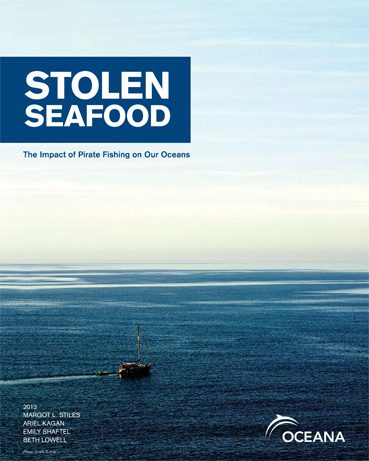Report | May, 2013
Stolen Seafood | The Impact of Pirate Fishing on Our Oceans
Pirate fishing may be understood best by standing on the beach and gazing out to sea. Almost all crime at sea takes place beyond the horizon line, hidden from view. This vast wilderness is exploited not only for fish, but as a hiding place for criminal activities.
Stolen fish are caught illegally, evading a wide range of safeguards to undercut the costs of doing business. Blatant violation of catch limits, gear restrictions and safety precautions are frequently carried out by a small fraction of fishermen, undermining the efforts of responsible fishing companies. The resulting damage to marine resources can lead to smaller catches, slowed recovery of depleted stocks or even collapse for the most vulnerable fisheries.
Pirate, or illegal, fishing is often lumped together with unregulated and unreported fishing under the abbreviation “IUU.” Unregulated fishing takes place in nations that lack the resources to establish fisheries laws or monitoring. Some unreported fishing stems from a lack of scientific data collection, while other unreported catches conceal illegal activity. These three dimensions of illegal fishing are a major threat to the oceans, consumers and seafood businesses around the world.
- Press Release: Oceana Report Finds that Illegal Fishing Connected to Seafood Fraud
- View related photos on Flickr
- Media Inquiries, please contact Amelia Vorpahl, 202.467.1968, 202.476.0632 (cell) or avorpahl@oceana.org or Dustin Cranor, 202.341.2267, 954.348.1314 (cell) or dcranor@oceana.org




